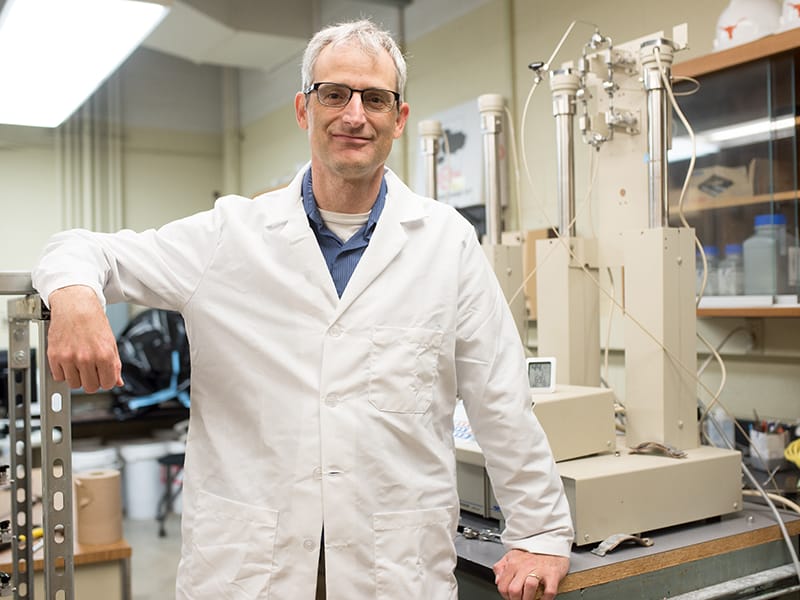David DiCarlo
Associate Professor
Cockrell Family Fellowship #5
Department Research Areas
Enhanced Oil Recovery
Reservoir Engineering
Petrophysics and Pore Scale Processes
Educational Qualifications
B.S., Physics with high honors, Case Western Reserve University, 1987
M.S., Physics, Cornell University, 1990
Ph.D., Physics, Cornell University, 1994
PGE Courses Taught
PGE 384: Advanced Thermodynamics
PGE 326: Thermodynamics and Phase Behavior
PGE 322K: Transport Phenomena in Geosystems
PGE 383: Advanced Multi-Phase Flow in Porous Media
Research
Dr. David DiCarlo’s research is focused on applying advanced experimental techniques to understanding fluid flow in hydrocarbon reservoirs. In particular, judicious use of CT scanning provides in-situ phase saturations which can then be converted into permeabilities and relative permeabilities. These can be obtained on a much shorter time scale and over a wider range of saturations then traditional steady-state methods. Topics relevant to enhanced oil recovery such as three-phase flow (water, oil, and gas), surfactant imbibition, compositional displacements, flow stability, and the effect of nanoparticles in porous media are studied using these methods.
Awards & Honors
SPE Regional Reservoir Description and Dynamics Award, 2014.
Nominated for favorite professor in Petroleum Engineering Department at the University of Texas, Austin by the engineering students 2008 and 2009.
PGE Departmental Teaching Excellence Award, 2008.
Nominated by PGE for Outstanding Engineering Teaching by an Assistant Professor, Cockrell School of Engineering, 2011.
Research on saturation overshoot was spotlighted in EOS Research Spotlight, EOS, 92, No. 21, May 24, 2011.
Highlighted Publications and Google Scholar Profile
D. A. DiCarlo, B. Aminzadeh, M. Roberts, D.H. Chung, S.L. Bryant, and C. Huh, “ Mobility control through spontaneous formation of nanoparticle stabilized emulsions,” Geophysical Research Letters, 38, L24404, 5 PP. doi:10.1029/2011GL050147 (2011).
H. Dehghanpour, B. Aminzadeh, and D.A. DiCarlo, “Hydraulic conductance and viscous coupling of three-phase layers in angular capillaries,” Physical Review E 83, 066320 (2011).
H. Dehghanpour, B. Aminzadeh, M. Mirzaei, and D.A. DiCarlo, “Flow coupling during three-phase gravity drainage,” Physical Review E 83, 065302 (2011).
D. A. Diarlo, B. Aminzadeh, and H. Dehghanpour, “Semi-continuum model of saturation overshoot and gravity driven fingering in porous media,” Water Resour. Res., 47, W03201, doi:10.1029/2010WR009879 (2011).
D.A. DiCarlo, M. Mirzaei, and K. Jessen, “Simulation of compositional gravity drainage processes,” SPE Journal SPE-110077-PA 812-827, doi: 10.2118/110077-PA (2011).
B. Aminzadeh and D.A. DiCarlo, “The transition between sharp and diffusive wetting fronts as a function of imbibing fluid,” Vadose Zone Journal 9, 588-596, doi:10.2136/vzj2009.0072 (2010).
D.A. DiCarlo , “Can continuum extensions to multi-phase flow models describe preferential flow?,” Vadose Zone Journal 9, 268-277(2010).
D.A. DiCarlo, R. Juanes, T. LaForce, and T. Witelski, “Nonmonotonic traveling wave solutions of infiltration into porous media,” Water Resources. Research, 44, W02406, doi:10.1029/2007WR005975 (2008).
D.A. DiCarlo, “Experimental measurements of saturation overshoot,” Water Resources Research, 40, W04215, doi:10.1029/2003WR002670 (2004).
D.A. DiCarlo, A. Sahni, and M.J. Blunt, “Three-phase relative permeability in water-wet, oil-wet, and mixed-wet sandpacks,” SPE Journal 5, 82-91 (2000).
